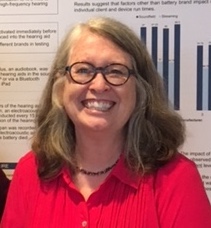 Kris English, PhD
Kris English, PhD
Professor Emeritus, Audiology
The University of Akron
In early February 2023, the Ida Institute in Denmark announced that it is “significantly scaling back activities” as its funding comes to an end. Fortunately, its deep library of tools, online courses and other resources will remain available. These developments are highlighted here to honor Ida’s direct and enduring impact on audiologic counseling.
An Easy-to-Miss “Ida Impact:” A Consistent Focus on Person-Centeredness
Because of the many contributions Ida has made to audiologic practices in the past 15 years, its philosophical commitment to the concept of person-centered care could be taken for granted. When the organization began to define itself in 2007, the term had not been widely used; just 6 years prior, the Institute of Medicine’s (2001) report identified the concept of patient-centered care as a pillar of quality health care. Because of IOM’s stature, “PCC” became a widely accepted concept. Soon, however, concerns were raised about the term’s inherent limitations (e.g, Clarke & Fawcett, 2016; Mezzich et al, 2010; Miles & Mezzich, 2011). By listening carefully to those concerns as expressed by persons and families living with hearing loss and by thought leaders in audiology, Ida became one of the early adopters of another version of “PCC:” the more empowering concept of person-centered care.
The difference in wording may not have been immediately appreciated, but over time it began to sink in: the shift from patient to person reflects a difference in power, focus, and priorities. Compare these distinctions (Eklund et al., 2019):
The goal of Patient-Centered Care is to support a functional life…
- as defined by clinicians
- determined by test results (words, sentences in quiet, noise, etc)
- to address listening challenges at home, work.
Whereas … the focus of Person-Centered Care is to support a meaningful life…
- as defined by individuals with hearing loss and family
- determined by understanding the whole person (“what matters to you?”)
- whose individual goals may change over time.
Implications: Checking Our Priorities
These two models of centeredness represent different priorities, which by definition means assigning more weight or importance to one “thing” than to other things. For instance, clinician trainees understandably prioritize the dozens of details involved with assessment and treatment — there is indeed a lot to remember and apply. However, when those tasks have been mastered, we can shift to a broader priority, i.e, “being more focused on the person than on the task” (DiLollo & Favreau, 2010; Granberg & Skagerstrand, 2022; Grosch et al, 2008).
“Being More Focused on the Person Than on the Task”
This short phrase is easy to remember and carries two salient points: (1) being “focused” implicitly includes behaviors typically associated with counseling (active listening, empathy, shared decision-making, etc), and (2) it doesn’t dismiss the importance of our tasks. We can attend to both the person and the tasks in the time allotted, but only if we actively prioritize. When we focus our undivided attention to someone’s personhood for even a very brief time, that person’s experience is about feeling unique, being heard, and sharing responsibility (Feldthusen et al, 2022). Students may not perceive this balance as they master the necessary tasks, but we need to advise them: once these are mastered, move on! Figuring out how to focus more on the person in front of us is our life-long goal.
To the Ida Team…
… Lotte, Ena, Hans, Cher, Natalie, Clint, Anne, Mei and all the change agents at Ida: You brought audiologists together, helped us move forward, and helped persons with hearing loss be heard.

References
Clarke PN, Fawcett J. (2016). Nursing knowledge driving person-centered care. Nursing Science Quarterly, 29(4), 285-287.
DiLollo A, Favreau C. (2010). Person-centered care and speech and language therapy. Seminars in Speech and Language, 31(1), 90-97.
Miles A, Mezzich J. (2011). Person-centered medicine: Advancing methods, promoting implementation. International Journal of Person Centered Medicine, 1(3), 423-428.
